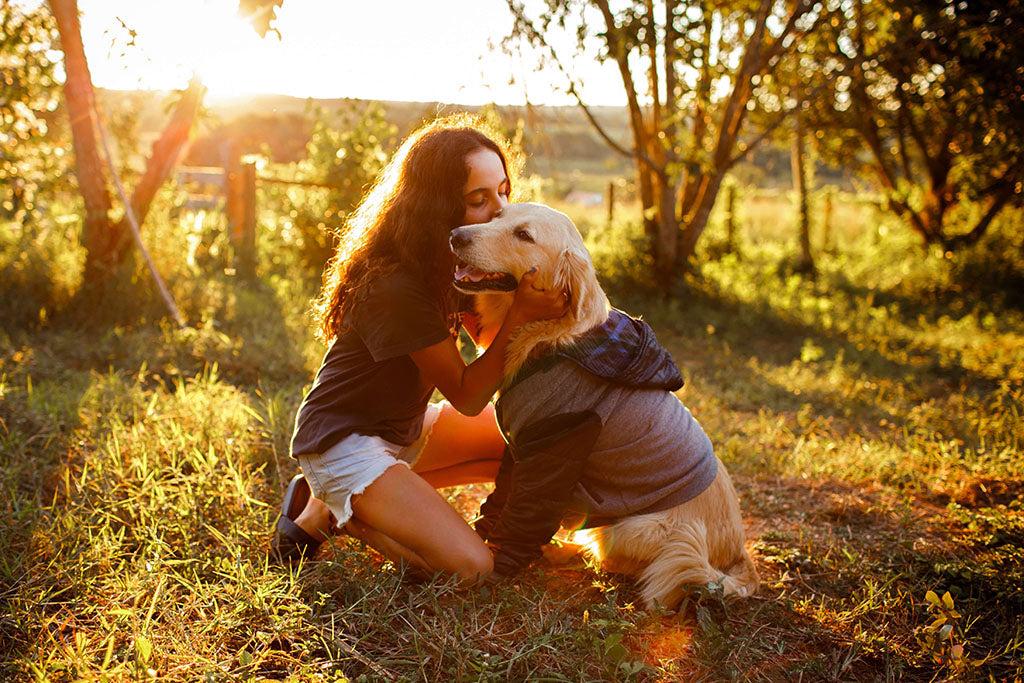Do dogs have a favorite person?… Is it you?…
Well, as much as we’d ALL love to say that we’re our dog’s favorite, there’s actually a biological science behind it. But how do dogs choose their favorite person?
If your pup follows you all the time or snuggles up in your belongings when you’re not home, not only are you their favorite, but your dog may have imprinted on you…
What Is Imprinting?
To start, let’s learn what imprinting is…
Imprinting is a form of learning that often happens with precocial species (animals born with feathers, scales, or hair, as well as the ability to move, see and hear) when they’re born. It’s an important learning period when the animal discovers very quickly what they are and who their ‘protector’ or ‘mother’ is, creating strong bonds with this caregiver.
This instinctual behavior is very common in birds, goats, zebras, and hyenas. For example, when geese and ducks hatch from their eggs, they will immediately waddle to the first moving object they see – which is normally their parents.
Now, this is when things can get interesting. It has been known for ducks, geese, and other types of animals to imprint on another animal outside of their species or even people!
That’s right, this means your dog might be able to imprint on you…
Can Dogs Imprint on People?
When it comes to our canine companions, the process of imprinting is slightly different…
Like humans, cats, and other mammals, puppies are very vulnerable when they’re born – without fully developed hearing, eyesight, or movement. Human babies, puppies, and kittens rely heavily on their mothers in the early stages of life, so imprinting (or bonding) normally occurs later.
It is normally when a puppy is 8-12 weeks old that they may imprint on a person. It’s normally at this age when humans adopt their fur babies and bring them home – so it makes sense that this is the crucial stage your dog may choose you as their caregiver. After all, they’ll learn to know you as their source of food, shelter, comfort, and safety.
It’s worth noting that not all dogs will imprint on their owners, and some may imprint on other objects or animals instead. For example, a dog may imprint on a particular toy or blanket, and become highly attached to it. Similarly, a dog may imprint on another dog in the household, and become highly bonded to them instead of their owner.

Signs Your Dog Has Imprinted On You
Not sure if your dog has imprinted on you? Here are 8 signs you need to look out for…
- They follow you
- They imitate and mirror your behaviors
- They regularly check in with you
- They lean on you
- They make eye contact with you
- They snuggle into your belongings when you’re not there
- They listen to your commands more so than others
- They’re relaxed around you
When a dog imprints on a person, it’s important to encourage and strengthen this bond in a positive way. Training and positive reinforcement can help to reinforce this special bond between you and your dog, and can even help to prevent any aggressive or possessive behaviors from developing…

The Downside of Imprinting
Now, although imprinting sounds amazing – knowing you’re your dog’s most trusted person – it’s also important to be aware of the potential downsides of imprinting…
As mentioned above, some dogs can develop separation anxiousness or aggressive behaviors towards other people or animals. If you have a dog that has imprinted on you and is displaying these behaviors, it’s important to seek professional help from a veterinarian or a professional dog trainer. With the right guidance and support, you can help your dog to develop a healthy and positive bond with you, while avoiding any negative behaviors.
Final Thoughts
So, while imprinting it’s often associated with birds, it can happen in dogs as well. However, not all dogs will imprint on their owners, so if you’ve noticed your dog showing signs of imprinting, then it’s quite likely they have – or in other words, you’re their favorite!
Sources
Author McGrath, Jane, “How Animal Imprinting Works”, HowStuffWorks, https://animals.howstuffworks.com/animal-facts/animal-imprinting.htm
Author Greene, Patricia, “8 Types of Animals That Imprint”, Wildlife Informer, https://wildlifeinformer.com/animals-that-imprint/







